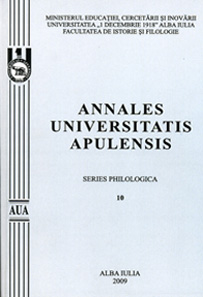On the Expressiveness of Verbs
On the Expressiveness of Verbs
Author(s): Maria-Crina HerțegSubject(s): Literary Texts
Published by: Universitatea »1 Decembrie 1918« Alba Iulia
Keywords: expressiveness; tense; temporality; opposites.
Summary/Abstract: The aim of this paper is to identify expressive uses of verb tenses, as we believe that this category seems to offer many possibilities of interpreting and modulating the action. The expressive connotations of verbs can be easier identified in literary texts and less easy in standard language which is meant to convey ideas and information. To enforce this idea we will show that the semantic classes of verbs combined with the category of tense can play an important role in the organization of the text: in case of Flaubert`s Madame Bovary and L`éducation sentimentale – the use of verba dicendi in the perfect simplu can entail gradual degrees of expressiveness (murmurer, balbutier, bégayer). It can thus reinforce expressive uses of verbs and refine the existing ones. In literary texts each tense bestows the text different expressive overloading: the perfect simplu and present objectify the action, the mai mult ca perfect is the tense of anteriority and causality, the perfect simplu imprints a quick development, the imperfect is the tense of duration. Besides the stylistic connotations implied by the semantic classes of verbs, we can also notice that the context, the determinatives, the figurative meanings as well as the temporal oppositions established in long fictional units highlight the expressive potential of language. The use of verbs in literary texts renders the action more dynamic, it makes events unfold quickly and it leaves the reader with the impression that the rhythm of events gets quicker as they read. By resorting to different tenses and expressive uses of verbs every writer creates his own temporal coordinates by using exclusively certain tenses, by combining them in order to create temporal oppositions. The choice of tenses is in close connection with the temporal perspective of the action, for example the quick unfolding of events in the novel La peste is rendered by the tenses parfait simple – imparfait, while in the novel L`etranger the tenses parfait compose and the imparfait give the impression that the action moves very slowly. Other alternative would be the use of a tense which covers most part of the fictional unit and the intermittent use of another tense, as it is the case of Moll Flanders, where the action is narrated in the past and from time to time verbs are used in the present. The shift from one tense to another within the same context can also have stylistic implications. In the novel Moll Flanders the shift from present to past is joined by the one from the narrator`s comments and points of view to the story and it involves a turn from the heroine’s present to previous events in her life.
Journal: Annales Universitatis Apulensis. Series Philologica
- Issue Year: 11/2010
- Issue No: 2
- Page Range: 220-230
- Page Count: 9
- Language: English

